SEO
How AI Helps You Rank Higher on Google (2026 Guide)
AI makes your website easier to find on Google. It shows you the right words people search for, helps you write clear content, and makes your site easy to use. This way, your website can appear higher in Google results and attract more visitors.
A surprising change is happening on Google. Today, AI-powered summaries appear in more than half of all search results. At the same time, 86% of SEO experts now use AI in their work, and most of them are seeing better results because of it. This shows that AI is no longer a future idea; it is here now, changing SEO forever.

Ranking high on Google is crucial for any business. It brings in organic traffic, which is vital for brand visibility, getting new leads, and increasing revenue. When people can find you easily on Google, your business can grow.
AI is transforming how we do SEO. It makes the process more efficient by automating slow tasks. It makes our strategies more data-driven by providing deep insights. And it makes SEO more accessible, so even non-experts can get great results.
This article is a practical guide to using AI for better Google rankings. We will explore simple, effective strategies you can use right away. You will learn how AI can help you create better content, fix technical issues, and ultimately, climb higher in the search results.
How AI Impacts Google Rankings
To understand how AI can help you rank higher, we first need to see how Google itself uses AI. Google's goal is to give users the best possible answers. It uses powerful AI systems to understand both the content on a webpage and how people interact with it. This has completely changed the rules of SEO.
Google’s AI and Search Algorithms
Google has built several "AI brains" that have gotten smarter over time. These systems help Google think less like a computer and more like a person.
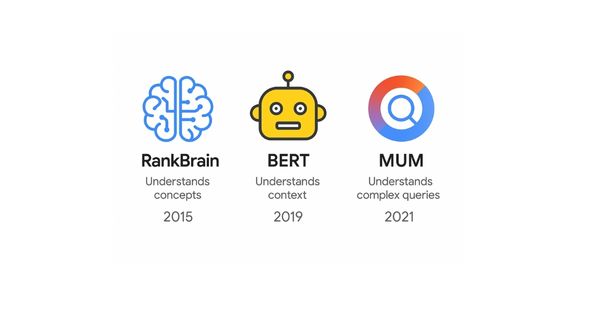
- RankBrain (2015): This was Google's first major AI for search. Its main job is to understand the concepts behind a search query. It helps Google figure out what you really mean, even if you use words it has never seen before.
- BERT (2019): BERT was a huge leap forward. It is excellent at understanding the full context of a sentence. It pays close attention to small but important words like "for" and "to," which can change the meaning of a search. Thanks to BERT, Google understands natural, human language much better.
- MUM (2021): MUM is Google's newest and most powerful AI. It is 1,000 times more powerful than BERT and can understand information from text, images, and even different languages. Its goal is to answer very complex questions in a single search.
Because of these smart AI systems, old SEO tricks like "keyword stuffing" (repeating keywords over and over) no longer work. Today, the most important factor is matching user intent. This means understanding why someone is searching and giving them the exact answer, they need.
AI-Driven Content Relevance
Google's AI doesn't just look for keywords; it looks for meaning. This is where AI tools become incredibly helpful for content creators. They help us create content that perfectly matches what a user is looking for.
AI tools can perform a content gap analysis. They scan the top-ranking pages for a topic and show you what information is missing. This allows you to create the most complete and helpful article on that subject.
AI also helps you build topical authority. It shows you all the related subtopics and questions you need to answer to be seen as an expert. By covering a topic completely, you send a strong signal to Google that your page is a high-quality resource.
User Experience Signals
Google's AI carefully watches how users interact with your page. These are called user experience signals, and they are very important for your ranking.
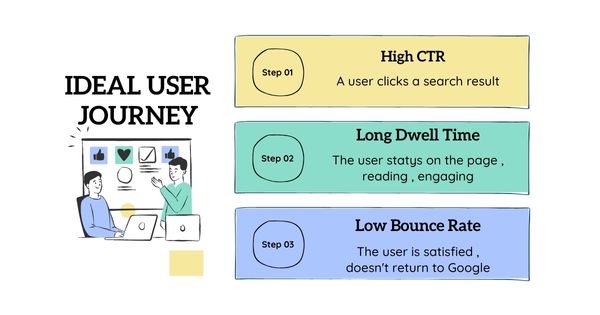
- Click-Through Rate (CTR): A high CTR tells Google that your title is interesting and relevant to people searching.
- Dwell Time: A long dwell time on your page is a great sign. It means the user is engaged and found what they were looking for.
- Bounce Rate & Pogo-Sticking: If a user leaves your page quickly (a bounce) and clicks on a different result (pogo-sticking), it sends a strong negative signal. It tells Google your page was not a good answer.
Google's AI looks at all these signals together. A positive pattern of a high CTR and a long dwell time tells the AI that users love your page. This can lead to a significant boost in your rankings.
Practical AI-Driven SEO Strategies
Understanding the theory is important, but results come from action. This section provides practical strategies you can use to improve your Google rankings with the help of artificial intelligence. We will cover how to use AI to master keywords, optimize content, perfect your technical foundation, and engage your users.
AI for Keyword Research and Topic Clustering
AI has completely changed how we find and use keywords. It moves beyond simple search volume to uncover the real intent behind a search and helps you build the authority Google wants to see.
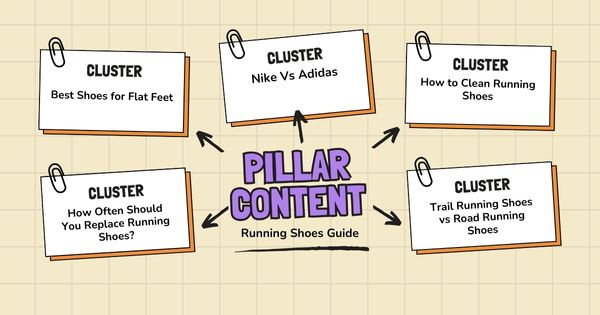
A key strength of AI is its ability to find untapped, conversational keywords. These are often long, question-based phrases that people use when speaking or typing naturally. For example, instead of targeting the competitive term "running shoes," an AI might identify a high-intent question like, "how to choose the right size running shoes for flat feet?" These queries often have less competition and are used by people closer to making a decision.
Furthermore, AI is essential for building topic clusters. To rank well today, you need to be seen as an expert on a subject. AI helps you map out a main "pillar" topic and all the related "cluster" subtopics you need to cover. By creating content for this entire cluster and linking it together, you prove your authority to Google in a way that targeting single keywords never could.
AI for Content Optimization
Once you know which topics to target, AI gives you a clear blueprint for creating content that is built to rank.
AI tools can perform a comprehensive analysis of top-ranking pages in seconds. They deconstruct the content of your top competitors to show you the patterns of success. You'll learn the ideal word count, the most effective heading structure, and which related terms and concepts you must include to be competitive.
This process ensures you achieve comprehensive topic coverage. AI performs a "content gap analysis" to identify important subtopics that your competitors have missed. By filling these gaps, you can create the single most valuable and complete resource on the subject, which is a powerful signal to Google's ranking algorithms.
AI for Technical SEO
A strong technical foundation is critical for SEO, and AI can act as your 24/7 website monitor to keep it flawless.
One of the most powerful uses of AI is for automating site audits. An AI-powered tool can continuously crawl your website to find and flag technical issues like broken links, slow page speeds, or problems with mobile usability. This allows you to fix errors proactively before they have a chance to harm your rankings. AI-driven insights can provide specific, prioritized recommendations to make your site faster and more user-friendly, directly improving key ranking factors.
AI for User Engagement
Finally, AI can help you improve the user experience signals that Google values so highly.
You can use AI to personalize the user experience. AI algorithms can analyze a visitor's behavior to show them the most relevant content or product recommendations. This creates a more engaging experience, encouraging users to stay on your site longer and interact more with your content.
Another effective tool is an AI chatbot. By providing instant answers to visitor questions around the clock, chatbots can improve user satisfaction and increase dwell time. They act as helpful guides, reducing frustration and keeping users on your site. While human oversight is still best for crafting high-CTR meta descriptions, AI can provide excellent first drafts, saving you valuable time.
Real-World Evidence: AI and SEO Success
The strategies we've discussed are not just theories; they are delivering powerful results for businesses right now. From major corporations to individual entrepreneurs, AI is proving to be a game-changer for search engine optimization.
Case Studies: How Companies are Winning with AI
Across many industries, companies are seeing huge growth by integrating AI into their SEO strategies.
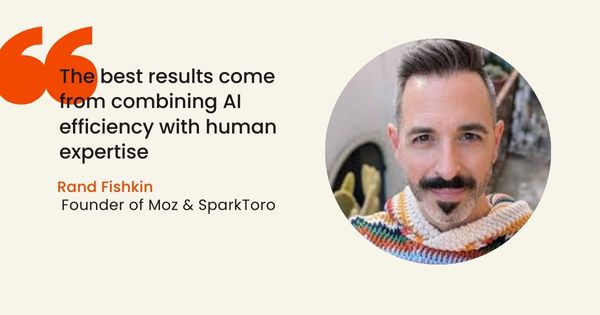
One leading financial website, Bankrate, began using AI to help produce articles. With human editors ensuring quality, they published over 160 AI-assisted articles that now bring in 125,000 organic visitors every month, proving that high-quality, AI-supported content can rank at the top of Google.
A footwear company, Rocky Brands, used AI to better understand their customers' searches. This led to a 30% increase in search revenue and a 74% growth in year-over-year revenue, showing the direct impact of AI on the bottom line.
Even in highly competitive markets, AI provides an edge. A cloud security company named Fugue used AI to analyze their competitors and find content gaps. By creating more comprehensive content, they were able to improve their ranking for a key term from the 10th position all the way to number one.
These examples show a clear pattern. Companies that use AI to scale their content, understand their customers, and create higher-quality articles are seeing massive increases in traffic, rankings, and revenue.
Expert Opinions: What SEO Leaders are Saying
The most respected leaders in the SEO industry agree that AI is fundamentally changing the field.
Neil Patel, a world-renowned digital marketer, states that AI has "democratized SEO," allowing small businesses to compete with large corporations using powerful tools. He has seen clients achieve "200-300% improvements in organic traffic" by using AI-driven content strategies.
Rand Fishkin, the founder of Moz and SparkToro, emphasizes the importance of human-AI collaboration. He says, "The best results come from combining AI efficiency with human expertise." AI handles the data, while humans provide the creativity and strategy that make content truly exceptional.
Even Google's Public Liaison for Search, Danny Sullivan, has weighed in. He confirms that what matters most is helpful content, stating that their systems are designed to reward "original, helpful content regardless of how it's produced."
The consensus is clear: AI is not a replacement for skilled SEO professionals but a powerful tool that augments their abilities. The future of SEO belongs to those who can strategically combine the efficiency of artificial intelligence with the creative and strategic oversight of a human expert.
Challenges and Limitations of AI in SEO
While artificial intelligence is a powerful ally, it is not a magic solution. To use it effectively, we must understand its limitations and the essential role that human experts play.
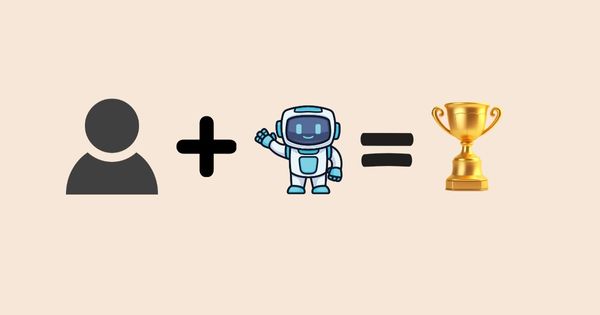
Where AI Falls Short
AI is brilliant at processing data and recognizing patterns, but it struggles with the things that make content truly great.
First, AI cannot replace human creativity. It can analyze what has worked in the past, but it cannot generate a truly original idea or a unique angle that captures an audience's attention. The most memorable and shareable content still comes from human ingenuity.
Second, AI struggles with brand voice and emotional nuance. It can mimic a certain tone, but it cannot truly understand a brand's personality or connect with a reader on an emotional level. Content that lacks this human touch can feel generic and fail to build the trust that is so important for a loyal audience.
Google’s Stance on AI-Generated Content
Many people wonder if Google penalizes content made with AI. The answer is no, but with an important condition.
Google has been very clear: they care about quality, not how the content was made. Their official guidelines state that AI-generated content is perfectly acceptable as long as it is helpful, reliable, and created for people first, not just for search engines.
This focus on quality is also why it's no longer enough just to rank on Google. The new goal is to be the source AI engines use for their answers. In fact, learning how to get your content cited by ChatGPT is now a critical part of a modern visibility strategy.
Content that is created simply to manipulate rankings, whether by a human or AI, will be penalized. The key is to use AI as a tool to create high-quality, user-focused content that demonstrates expertise and trustworthiness.
The Need for Human Oversight
Because of AI's limitations, human oversight is not just recommended; it is essential for success. The best results always come from combining AI's analytical power with human expertise.
A human expert provides the strategic direction that AI cannot. They understand the business's goals, the competitive landscape, and the long-term vision. They guide the AI to ensure its work aligns with this broader strategy.
Most importantly, a human provides the final quality check. They ensure factual accuracy, inject brand personality, and add the creative spark and personal experience that AI lacks. This human-in-the-loop approach is what turns good, AI-assisted content into great content that ranks high and earns trust.
How Marketers Can Prepare
The future of AI in SEO is exciting, and preparing for it now will give you a major advantage. Success comes down to focusing on three key areas: improving your skills, deeply understanding your users, and using AI to scale your strategies intelligently.
Upskilling for an AI-Powered World
To succeed, marketers must embrace continuous learning. It's important to become proficient with AI tools, understanding both what they can do and where they fall short. This means developing stronger data analysis skills to interpret the insights AI provides and staying up-to-date on how AI is changing technical SEO. The most valuable professionals will be those who combine their SEO expertise with a strong understanding of AI.
Focusing on User Intent
If there is one golden rule in the age of AI, it is this: focus relentlessly on user intent. AI gives us an unprecedented ability to understand what users are truly looking for. Use AI-powered tools to go beyond simple keywords and discover the specific questions, problems, and goals your audience has. Then, create content that provides the best possible answer. In an AI-driven world, the most helpful content will always win.
Leveraging AI for Scalable Strategies
Finally, AI allows us to implement powerful SEO strategies at a scale that was previously impossible. Use AI to automate repetitive tasks like technical audits and to get first drafts of content. This frees up your time to focus on strategy and creativity. The key is to scale intelligently. Always maintain human oversight to ensure quality, accuracy, and brand voice. The goal isn't just to create more content, but to create better content, more efficiently.
Artificial intelligence has fundamentally changed the landscape of search engine optimization. As we've seen, AI offers a powerful suite of tools to help you rank higher on Google. It enables smarter keyword targeting by uncovering conversational queries and building topic clusters. It streamlines content optimization by analyzing top competitors and ensuring comprehensive coverage. AI also strengthens your technical foundation through automated audits and improves user engagement with personalization.
As you begin to integrate AI into your own SEO efforts, here are three key takeaways to guide you:
- Start small. You don't have to do everything at once. Begin by using an AI tool for a single task, like keyword research or performing a content gap analysis on an old blog post. Get comfortable with the technology and build from there.
- Always prioritize user intent and content quality. The most important lesson from Google's own use of AI is that it rewards content made for people. Use AI to better understand and serve your audience, not to create generic, low-quality articles.
- Combine AI efficiency with human creativity. AI is an incredible assistant, but it is not a replacement for your expertise. The most successful strategies come from using AI to handle the data and repetitive tasks, which frees up your time to focus on strategy, creativity, and adding the unique human touch that makes your brand special.
Ultimately, AI is a powerful ally in the quest for better Google rankings. It provides insights and efficiencies we could only have dreamed of a few years ago. However, success is not guaranteed by simply using the tools; it is achieved by using them strategically. By combining the power of artificial intelligence with a deep commitment to quality and a clear understanding of your audience, you can build a winning SEO strategy that stands the test of time.
Join the Discussion (0 )
Be the first to leave a comment!
Leave a Comment